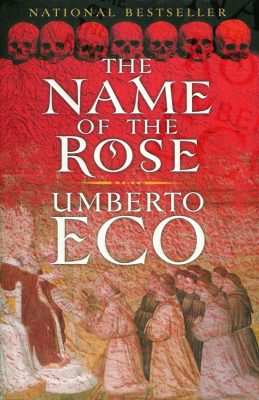
What I think
-
Plot
-
Settings
-
Characters
-
Writing
If you liked this you might like:
The Aubrey-Maturin series
Buy now from Amazon
This book grabbed me from the word go, with an endearing narratorial voice and an interesting premise.
From his cell in a Benedictine monastry in Melk, Adso remembers the events of his past, focusing on his journey to Italy as a youthful temporary apprentice to Franciscan mediator, William of Baskerville. William is established as a keen amateur Sherlock at the outset, predicting to some searching monks the identity and location of the abbot’s stray horse. He reveals to Adso his method – pure deduction from physical evidence and knowledge of the context of religious life.
His formal task is to advise on a reconciliation between the Franciscan brotherhood and the Avignon pope – but as a man with reputation in such matters and former inquisitor, he is tasked by the abbot Abo to investigate a mysterious recent death on the monastery grounds. The abbot hints that he has received hints in confession but, of course, these cannot be used to bring any perpetrator to justice. Thus begins William and Adso’s investigation.
The scene is set well, with the narrator in his act of putting his memories in context able to give the reader the historical background needed to understand the story. The history itself is fascinating, and stems out of philosophical debate within the western church in the twelfth and thirteenth centuries as to the doctrinal validity of preaching poverty. This is the reason for William’s mission as a potential mediator – and also turns out to have a bearing on the outcome of his murder investigation.
The writing is incredibly learned, peppered with Latin quotations of the Bible and Biblical authorities. It also spans philosophical conundrums from the nature of love and lust, to the question of the derivation of knowledge, to the moral value of laughter and much in between. None of it reeks of the modern age, yet it speaks very potently to the modern reader of modern issues.
I found that The Name of the Rose performed with great panache that sovereign function of the novel – it transported me to another world, another time with other people in it, yet illustrated to me the universality of human nature. On the way it spoke of great ideas with beautiful and memorable eloquence, and of men with compassion and humour in turn. I think this is a fantastic novel, and rate it very highly indeed.
